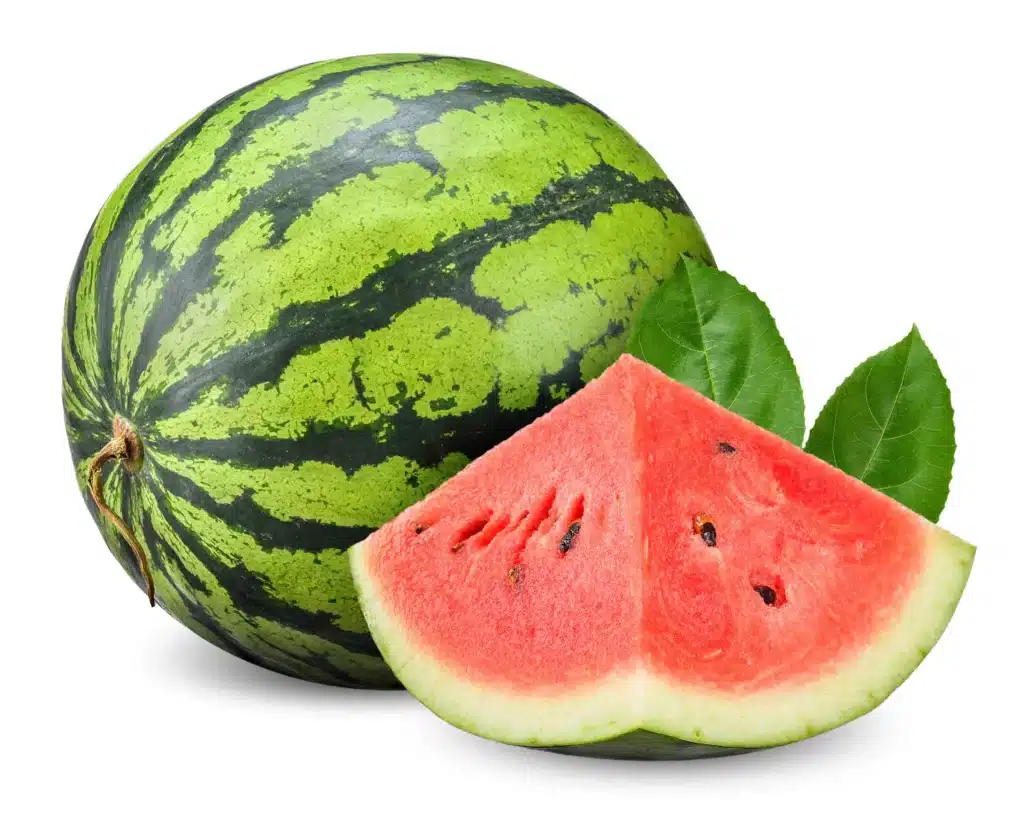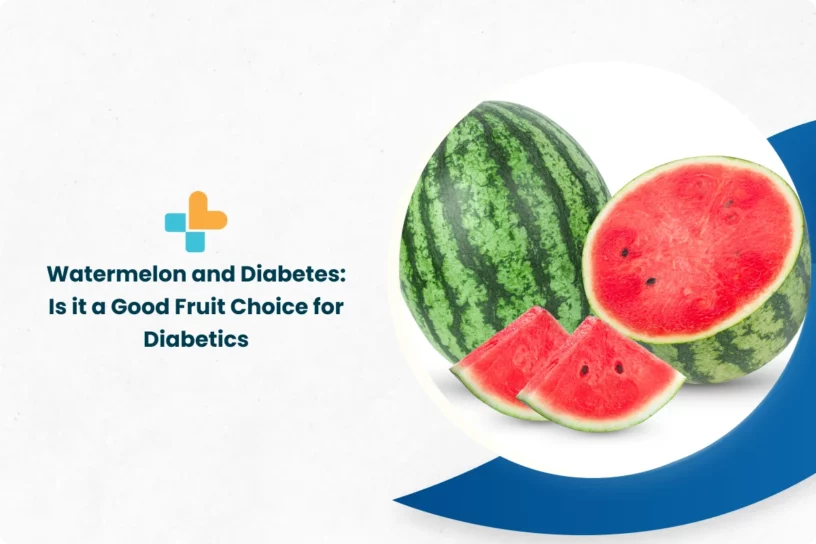Watermelon is a delicious and refreshing fruit that many people enjoy during the summer months. However, for people with diabetes, there may be concerns about whether or not watermelon is a safe choice due to its high natural sugar content.
In this blog, we will explore the relationship between watermelon and diabetes, including its nutritional benefits and potential risks, to help individuals with diabetes make informed decisions about incorporating watermelon into their diet.

Is Watermelon Good for Diabetes?
Watermelon is a nutritious fruit that contains a variety of vitamins, minerals, and antioxidants that can provide many health benefits. However, for people with diabetes, there may be concerns about the natural sugar content in watermelon, which can potentially spike blood sugar levels. Despite this, watermelon can still be enjoyed in moderation as part of a healthy and balanced diet for individuals with diabetes.
The key is to be mindful of portion sizes and to monitor blood sugar levels carefully when consuming watermelon. Additionally, incorporating watermelon as part of a balanced meal can help to slow down the absorption of sugar into the bloodstream.
Overall, watermelon can be a tasty and nutritious addition to a diabetic diet when consumed in moderation and as part of a healthy meal plan.
Watermelon and Blood Sugar
Watermelon has a high glycemic index (GI), which means it can cause a rapid increase in blood sugar levels after consumption. However, the glycemic load (GL) of watermelon is relatively low, which takes into account the serving size and the amount of carbohydrates in the food. This means that eating a small portion of watermelon may not significantly impact blood sugar levels in individuals with diabetes.
Additionally, watermelon is rich in fiber, which can help slow down the absorption of sugar into the bloodstream, and it also contains lycopene, which may help improve insulin sensitivity. These factors may help offset the potential blood sugar spike that can occur after eating watermelon.
Overall, people with diabetes can still enjoy watermelon in moderation as part of a healthy and balanced diet, but it is important to monitor blood sugar levels and consume it as part of a meal to help minimize any negative impact on blood sugar levels.
Benefits of Watermelon

Watermelon is a nutrient-dense fruit that provides a range of health benefits. Here are some of the key nutrients found in watermelon and their associated benefits:
Vitamin A:
Watermelon is a good source of vitamin A, which is essential for maintaining healthy vision, immune function, and skin health. This nutrient also acts as an antioxidant, helping to protect cells from damage caused by harmful molecules known as free radicals.
Vitamin C:
Watermelon is also high in vitamin C, which is important for immune function, wound healing, and collagen production. This antioxidant vitamin can also help protect cells from damage and support cardiovascular health.
Potassium:
Watermelon contains potassium, an essential mineral that helps regulate blood pressure and supports heart health. This nutrient is also important for maintaining proper fluid balance in the body and supporting muscle and nerve function.
Amino Acid:
Watermelon is a good source of the amino acid citrulline, which the body converts to arginine. Arginine is important for maintaining healthy blood flow and promoting cardiovascular health.
Lycopene:
Watermelon is one of the best dietary sources of lycopene, a potent antioxidant that has been linked to a reduced risk of heart disease, certain cancers, and macular degeneration. Lycopene may also help improve skin health and protect against UV damage.
Overall, incorporating watermelon into your diet can help provide a range of important vitamins, minerals, and antioxidants that can support overall health and wellness.
Is Watermelon High in Sugar?

Watermelon is a naturally sweet fruit and does contain natural sugars, particularly fructose. However, compared to other fruits, the sugar content of watermelon is relatively low, with about 6 grams of sugar per 100 grams of fruit. Additionally, watermelon is high in fiber, which can help slow down the absorption of sugar into the bloodstream.
It is important to note that while watermelon may be relatively low in sugar, it does have a high glycemic index (GI), which means it can cause a rapid increase in blood sugar levels after consumption. However, the glycemic load (GL) of watermelon is relatively low, which takes into account the serving size and the amount of carbohydrates in the food. This means that eating a small portion of watermelon may not significantly impact blood sugar levels in individuals with diabetes.
Overall, while watermelon does contain natural sugars, it can still be enjoyed in moderation as part of a healthy and balanced diet. It is important to monitor portion sizes and consume it as part of a meal to help minimize any negative impact on blood sugar levels.
Also Read : Dapagliflozin: A Game Changer in Managing Type 2 Diabetes
Takeaway
Watermelon is a low-glycemic index fruit that can be a good choice for diabetics in moderation. However, it is important for individuals with diabetes to monitor their blood sugar levels and consult with their healthcare provider before adding any new foods to their diet.
In terms of healthcare service providers, Ayu Health may offer personalized guidance and support for individuals with diabetes, helping them manage their condition through tailored nutrition plans and lifestyle changes. It is always important to seek guidance from qualified healthcare professionals when managing chronic conditions like diabetes.
Our Hospital Locations
General Surgery Hospitals in Chandigarh | General Surgery Hospitals in Bangalore | General Surgery Hospitals in Jaipur | General Surgery Hospitals in NCR | General Surgery Hospitals in Hyderabad
Our Doctors
General Surgery Doctors in Chandigarh | General Surgery Doctors in Bangalore | General Surgery Doctors in Jaipur | General Surgery Doctors in NCR | General Surgery Doctors in Hyderabad
About the Author

Dr. S. Goel
Dr. S. Goel is a renowned Internal Medicine Specialist currently practicing at Ayu Health, Bangalore. He is a Specialist in Internal Medicine, Diabetes HTN, Paediatric Care, and Family Medicine.




